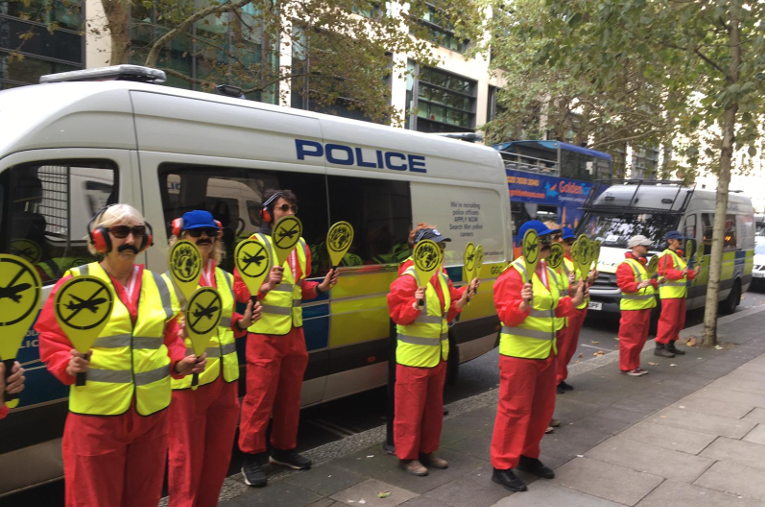I went to an extinction rebellion last year. No wait, two years ago. The year before the last year, when we all held our breath.
I went in two minds, decidedly undecided. At times I had defended the rebellion, standing by their principles: this is urgent. I had also doubted the method and questioned their tactics: is this too extreme, too alienating? When I put this to a friend who was involved she breathed a deep, patient breath and invited me to come along and see for myself.
So I went on a fresh autumn morning at the end of the protests in October 2019. It was the last stand, a plaintive, swan song moment. I came out of the tube station and followed the yellow brick road, streets covered with police officers and riot vans, to reach the rebellion. A helicopter flew over head. It was scary. Lines of uniformed people, their forbidding anonymity, the thick, fluorescent clothing that covered almost all their skin. A show of invulnerability. Their weapons. Black and bright yellow, shadows and warning. The man power was solidified by the horse power, huge riot vans parked nose to tail along the street, to blockade the blockaders. It made it hard to reach the protesters, to support them, to join them. You had to climb over a van or walk past the police officers, risking encounter and arrest.
We reached the end of the wall of police riot vans where a few wavering wall flowers waited, watching the action unfold. Following the great display of police power, a good kilometre of armed officers, it was magnificently underwhelming. Not even a hundred people gathered around a single van.
A woman stood alone on top of the van and a few people sat beside it, surrounding it, bodily protecting her from the police. When I arrived, these people were shouting, call and response.
‘Do we love the police?’ – ‘Yes, we do.’
‘Do we love the police’s children? – ‘Yes, we do.’
‘Are we doing this for the police?’ – ‘Yes, we are.’
‘Are we doing this for the police’s children?’ – ‘Yes, we are.’
For such a small group of people, they were varied, every age, every style of clothing. Teenagers and twenty somethings, middle aged and elderly. There was tie-die, there was careful colour co-ordination, there were tracksuits, there were suit suits.
The intense police presence did not prepare me for the tininess of the protest. Their strict formation and seemingly endless resources did not prepare me for the one van and scattered, ordinary people. People who looked like they’d just come from work or were going to work, people who were pregnant, or coming down with a cold, or had left the kids with a neighbour, or were writing their bachelor thesis. Ordinary people going the extra mile to come here on a cold Autumn morning and bring their hopes and fears into the open.
The cold fear and paranoia of the approach met a hot lump in my throat and a spreading warmth in my chest. Tears ran down my cheeks with unaccustomed ease. Grief. Anger. Joy. Gratitude. Love. Love for this small band of people and the disappearing world they represented. People who stand against a tide of police power and let it crash around them, people who stand up against a tide of blind, deaf, uniformed indifference and sing a very sad song.
An old man stood directly in front of me on the pavement. He was wearing a light, neat yet comfortable tracksuit with pristine white trainers. He was alone. He held a sign in his hands, currently somewhat casually, and I could read it. It said ‘I am doing this so I can look my grandchildren in the face’. He was standing tense and afraid and I could feel his fear. Was he more afraid of the police, the group of strangers he was about to join or facing the feelings that brought him here? I didn’t get a chance to ask. He steadied himself and stepped off the pavement and on to the street, walking stiffly past the police officers to join the heart of the protesters.
I followed him, dressed as a moustachioed air traffic controller to silently spell out climate and emergency in semaphores. The police tried to stop us but we made it through. It was a bizarre role to play, being amongst it all, standing straight and tall waving my arms in a strict, regular sequence. I felt present and remote, a witness. As we wore the ear protectors typical of an air traffic controller, the scene was even more surreal – the singing muted, the chants muffled, the protesting shouts of those arrested grotesquely silenced.
Though we were undoubtedly a part of the protest, our uniform and strict posture connected us to the line of linked police officers, who were also straight faced, also witnesses. I felt sorry for their plight, humans made mercenary and mechanical and mouthed along with the chant typical to extinction rebellion protests, that I could barely hear – do we love the police? yes, we do.
It’s just one point of view of one morning of one rebellion, it’s just one drop in the narrative ocean, but my blood ran so cold when I saw the bill recently proposed to further strengthen the police and weaken the people during protests that I had to warm it up again somehow. I had to remember that humans dig deep and stand up. Again and again and again.
Teaser photo credit: Taken by Jo Mackie outside the Department of Transport, Oct 2019





